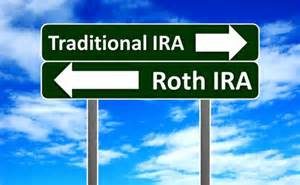Of late, I have been inundated by mutual fund and annuity vendors who are trying to convince me to convert all of the Traditional IRAs and 401k dollars of my clients into Roth IRAs. This has been a hot topic this year due to a recent change in the tax law that has lifted the ceiling on the income limits so that anyone who wants to convert to a Roth IRA can now do so. In the past, there was an annual income limitation of $100,000. Meaning that if you made more than $100,000 in earned income each year you would not be eligible to convert your Traditional IRA to a Roth IRA. It was quite amusing to me that most of the folks that it benefited to in the past earned more than $100,000 and were never able to convert to a Roth.
Now ask yourself, if it is such a great idea to convert to a Roth IRA, why is the government going to allow you to convert now? Why are all of the investment product vendors so excited about you converting your IRA? The answer to the first question is tax revenue. Our government needs a lot of tax revenue. One of the easiest ways to raise tax revenue is to convince you that it is a good idea to convert your IRA to a Roth and pay income taxes on the distribution now. But is it really such a good idea to pay income tax now than later? In most of the cases that I have reviewed the answer is NO! I have not been able to substantiate paying money today to the government when you can delay the payment now and earn money on the principal, tax-deferred. Also, you can control the flow of funds distributed out of the IRA once you retire, and, thusly, control your taxable income. Granted, I do agree that our future holds for higher income taxes, and for some people the conversion will make sense. And, our government has allowed you to spread the income tax burden out over two years.
The answer to the second question is when there is an opportunity to move money, the product vendors are very interested. It is a way to create YTB, \”Yield to Broker.\” That also includes the product vendors increased sales volume. Many of the vendors are offering free conversion calculators that use an assumed rate of return to prove that the Roth IRA conversion will be more valuable and have less income tax in the future than the Traditional IRA. \”Buyer beware of the assumptions.\” An associate of mine sat through a presentation where a Roth IRA conversion was shown to be the better option. Yet, when the presenter was asked for the assumptions used, after three weeks, my associate still had not received the assumptions requested. Therefore, my associate is left to believe that the assumptions were suspect.
When presented with analysis, be sure to ask for realistic assumptions. Look back at your actual rate of return over the last 10 years. Many investors have experienced very dismal rates of return on their investments over the last ten years. And it is very likely most average rates of return will still remain low for the next ten years. If you had not noticed by now we have been in a bear market, and we will continue to be in one for many years to come.
Keep in mind that not all Roth IRA conversion calculators are created equally. Be sure that the calculators use assumptions that not only include a rate of return, but also allow you to vary the income tax brackets, inflation factors, and variable distribution rates (the amount of money you distribute out of the Roth IRA upon retirement from year to year). And I am certain none of the calculators will consider the investment cost. Since you will most probably be approached by a new agent or broker trying to earn your business with this earth-shattering solution, you will more than likely be asked to move all of your IRA investments to another investment vehicle and that transaction will cost you money upfront. How many years will it take for you to recover from that expense?
The real opportunity to convert to a Roth IRA lies with the super-wealthy who have very large IRA\’s and will have tremendous estate planning issues to deal with. They will need to take a strong look at the opportunity to convert to a Roth and decide if the short term costs outweigh the long term benefits. And, since there are so many uncertainties, some will convert only a portion of their Traditional IRAs to a Roth IRA to hedge against making the wrong choice.
Warm regards,
Corey N. Callaway
Investment Advisor Representative
